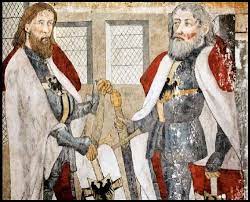
The Crusades
The Eighth Crusade (1270)
The Eighth Crusade was a crusade launched by Louis IX of France against the city of Tunis in 1270. The Eighth Crusade is sometimes counted as the Seventh, if the Fifth and Sixth Crusades of Frederick II are counted as a single crusade. The Ninth Crusade is sometimes also counted as part of the Eighth. The crusade is considered a failure after Louis died shortly after arriving on the shores of Tunisia, with his disease-ridden army dispersing back to Europe shortly afterwards.
Background
Despite the failure of the Seventh Crusade, which ended in the capture of King Louis by the Mamluks, the King did not lose interest in crusading. He continued to send financial aid and military support to the settlements in Outremer from 1254 to 1266. While the “crusade” of the King’s brother Charles of Anjou against the Hohenstaufen Kingdom of Sicily occupied Papal attention for some years, the advance of Baibars in Syria during the early 1260s became increasingly alarming to Christendom. The War of Saint Sabas between Genoa and Venice had drawn in the Crusader States and depleted their resources and manpower. The exhausted settlements were systematically overrun by the methodical campaigns of Baibars. By 1265, he had raided Galilee and destroyed the cathedral of Nazareth, captured Caesarea and Arsuf and temporarily took Haifa. In late 1266, Louis informed Pope Clement IV that he intended to go on crusade again.
Preparation
Louis formally took the cross on 24 March 1267 at an assembly of his nobles. A second ceremony took place on 5 June 1267 before a papal legate in Notre-Dame de Paris. Louis’s son-in-law, King Theobald II of Navarre, who had also taken the cross, was also present. The response was less enthusiastic than to his calling of the Seventh Crusade in 1248, although its unpopularity may have been exaggerated by his chronicler Jean de Joinville, who was personally opposed to the venture. The crusade set sail from Aigues-Mortes in early summer 1270 in Genoese and Marseillois shipping. An Aragonese contingent under James I of Aragon sailed from Barcelona in September 1269, but was caught in a storm and badly damaged; most of the survivors returned home, while one squadron under the King’s natural sons Pedro Fernández and Fernán Sánchez reached Acre. Too weak to engage Baibars, they soon returned to Aragon as well.
Louis’ initial plan was to descend on the coast of Outremer by way of Cyprus. However, a new plan was developed in 1269, wherein the fleet would first descend on Tunis. This change has often been attributed to the King’s brother Charles of Anjou, whose newly-conquered Kingdom of Sicily would benefit from a renewal of its traditional influence on Tunis. However, the details of Charles’ preparations suggest that he was not initially aware of the change of plans, which originated at the French court. Louis may have thought that Tunis was an important base of supplies for Egypt; Geoffrey of Beaulieu stated that the King thought that the Khalif of Tunis, Muhammad I al-Mustansir, might be persuaded to convert to Christianity, if given military support.
Pope Clement ceded a tenth of the church’s income in Navarre to King Theobald for the financing the crusade. The prior of Roncesvalles and the dean of Tudela were to oversee the collection of the tenth. The preaching of the crusade in Navarre was primarily undertaken by the Franciscans and Dominicans of Pamplona.
Campaign And Siege
A large and well-organized fleet under Louis IX sailed from Aigues-Mortes about a month late, on 1 July 1270. The following day a second fleet under the King of Navarre sailed from Marseille. The two fleets joined up at Cagliari on the southern coast of Sardinia. They landed on the Tunisian coast on 18 July. The crusaders built a fortified camp on the ruins of Carthage and awaited the arrival of the Sicilian contingent under Charles of Anjou. The North African summer bred pestilence, and an epidemic of dysentery swept through the crusading ranks. Louis’ Damietta-born son John Tristan died of the disease on 3 August. Soon Louis, too, fell sick, and died, in penitence, on a bed of ashes on 25 August. His brother Charles arrived just after his death.
Because of further diseases the siege of Tunis was abandoned on 30 October by an agreement with the sultan. In this agreement the Christians gained free trade with Tunis, and residence for monks and priests in the city was guaranteed. After hearing of the death of Louis and the evacuation of the crusaders from Tunis, Sultan Baibars of Egypt cancelled his plan to send Egyptian troops to fight Louis in Tunis. The treaty was quite beneficial to Charles of Anjou, who received one-third of a war indemnity from the Tunisians, and was promised that Hohenstaufen refugees in the sultanate would be expelled.
Prince Edward of England arrived with an English fleet the day before the crusaders left Tunis. The English returned to Sicily with the rest of the crusaders; the combined fleet was badly damaged in a storm off Trapani. At the end of April 1271, the English continued to Acre to carry on the Ninth Crusade.
The Crusades: The Eighth Crusade (1270)
801 – 007
https://discerning-Islam.org
Last Updated: 01/2022
See COPYRIGHT information below.


